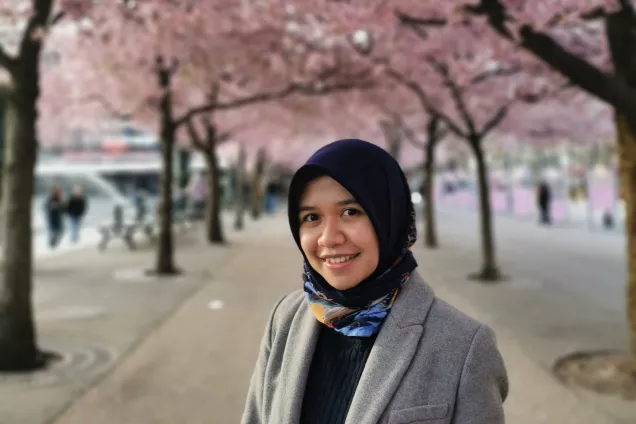Human Geography - Master of Science programme
Master's programme · 2 years · 120 credits

Description
The Master’s programme in Human Geography is a two-year international programme focusing on cultural, economic, social and political aspects of human activities from distinctly geographical perspectives.
Why do uneven geographies between people, neighbourhoods, cities, regions and countries develop? How do processes of globalisation and localisation affect firms and industries, people and places? What drives geographical changes – and are the geographies of such change socially and environmentally just? What can governments, companies, NGOs, activists and other actors at all scales do to address the big challenges of our time? These are the kind of questions human geographers ask and address.
The programme builds on the internationally recognised research by the academic staff at the Department of Human Geography. Our courses introduce you to the theoretical foundations as well as the research frontiers of the field, and they prepare you to develop and carry out your own advanced research in the MSc thesis. Through activities such as excursions, laboratories, internship, guest lectures and assignments, theory is linked to practice.
The programme prepares its graduates for a wide range of professions in public service, NGOs and the private sector. The flexibility of the programme’s second year makes it possible to tailor the education towards particular professions. This flexibility, and the Department of Human Geography’s commitment to critical and independent scholarship, also makes the master programme an ideal platform if you want to prepare for a research career – or simply to pursue a human-geographical topic that engages you.
The Department of Human Geography is a modern successful research institution which received great reviews in the University's internal research evaluation (RQ08). Both in research and education our Department is among the highest rated areas of the University and it hosts numerous relevant national and international research projects and educational programs.
Open for applications
Application opportunitiesClosed for applications
Learn more about our application periods and when to apply for studies at Lund University.
Contact
Email: huge [at] keg [dot] lu [dot] se
Requirements and selection
Entry requirements
To be eligible for the programme the applicant must have the equivalent of a Swedish Bachelor’s degree with a major (i.e. at least 90 ECTS credits) in Human Geography or equivalent.
English course 6 (advanced proficiency)
Selection criteria
The applicants estimated capacity to complete the programme is the primary criterion for selection. Students are selected on the basis of their previous study results (grades on courses and Bachelor’s degree essay), proficiency in English and statement of purpose.
English language requirements
Most of Lund University’s programmes require English Level 6 (unless otherwise stated under 'Entry requirements'). This is the equivalent of an overall IELTS score of 6.5 or a TOEFL score of 90. There are several ways to prove your English language proficiency – check which proof is accepted at the University Admissions in Sweden website. All students must prove they meet English language requirements by the document deadline, in order to be considered for admission.
How to prove your English proficiency – universityadmissions.se
Country-specific requirements
Check if there are any country-specific eligibility rules for you to study Bachelor's or Master's studies in Sweden:
Country-specific requirements for Bachelor's studies – universityadmissions.se
Country-specific requirements for Master's studies – universityadmissions.se
Apply
Start Autumn Semester 2025
Day-time Lund, full time 100%
In English
Study period
1 September 2025 - 6 June 2027
Application
Late applications are being accepted
How to apply
Lund University uses a national application system run by University Admissions in Sweden. It is only possible to apply during the application periods.
Step 1: Apply online
- Check that you meet the entry requirements of the programme or course you are interested in (refer to the section above on this webpage).
- Start your application – go to the University Admissions in Sweden website where you create an account and select programmes/courses during the application period.
Visit the University Admissions in Sweden website - Rank your programme/course choices in order of preference and submit them before the application deadline.
Step 2: Submit documents
- Read about how to document your eligibility and how to submit your documents at the University Admissions in Sweden website. Follow any country-specific document rules for Master's studies or Bachelor's studies
Country-specific requirements for Bachelor's studies – universityadmissions.se
Country-specific requirements for Master's studies – universityadmissions.se
- Get all your documents ready:
- official transcripts and high school diploma (Bachelor's applicants)
- official transcripts and degree certificate or proof that you are in the final year of your Bachelor's (Master's applicants)
- passport/ID (all applicants) and
- proof of English proficiency (all applicants).
- Prepare programme-specific documents if stated in the next paragraph on this webpage.
- Upload or send all required documents to University Admissions before the document deadline.
- Pay the application fee (if applicable – refer to the section below on this webpage) before the document deadline.
* Note that the process is different if you are applying as an exchange student or as a part of a cooperation programme (such as Erasmus+).
* If you have studied your entire Bachelor's programme in Sweden and all of your academic credits are in Ladok, you do not have to submit transcripts or your diploma when applying for a Master's programme. However, there may still be other documents you need to submit! See the link below.
* Svensk student?
Läs instruktionerna om att söka till ett internationellt masterprogram på lu.se
Programme-specific documents
In addition to the documents mentioned in Step 2, you must submit a statement of purpose (letter of intent) when you apply for this programme.
Further instructions on the Department of Human Geography's website
Tuition fees
Non-EU/EEA citizens
Full programme/course tuition fee: SEK 250 000
First payment: SEK 62 500
Citizens of a country outside of the European Union (EU), the European Economic Area (EEA) and Switzerland are required to pay tuition fees. You pay one instalment of the tuition fee in advance of each semester.
Tuition fees, payments and exemptions
EU/EEA citizens and Switzerland
There are no tuition fees for citizens of the European Union (EU), the European Economic Area (EEA) and Switzerland.
Application fee
If you are required to pay tuition fees, you are generally also required to pay an application fee of SEK 900 when you apply at the University Admissions in Sweden website. You pay one application fee regardless of how many programmes or courses you apply to.
- Paying your application fee – universityadmissions.se
- Exemptions from paying the application fee – universityadmissions.se
- Convert currency – xe.com
*Note that there are no tuition or application fees for exchange students or doctoral/PhD students, regardless of their nationality.
Scholarships & funding
Lund University Global Scholarship programme
The Lund University Global Scholarship programme is a merit-based and selective scholarship targeted at top academic students from countries outside the EU/EEA.
Lund University Global Scholarship
Within the framework of the Lund University Global Scholarship programme, the University also offers the African Research Universities Alliance (ARUA) Scholarship targeted at top academic students from selected African research universities.
Swedish Institute Scholarships
The Swedish Institute offers scholarships to international students applying for studies in Sweden at Master's level.
Scholarship information on the Swedish Institute website
Country-specific scholarships and funding options
Lund University has agreements with scholarship organisations and funding bodies in different countries, which may allow applicants to apply for funding or scholarships in their home countries for their studies at Lund University.
External scholarships
Testimonials about the Master's in Human Geography

"The practical perspectives are emphasised"
Dian from Indonesia

"It’s such a diverse programme in what you learn"
Anwen from the UK